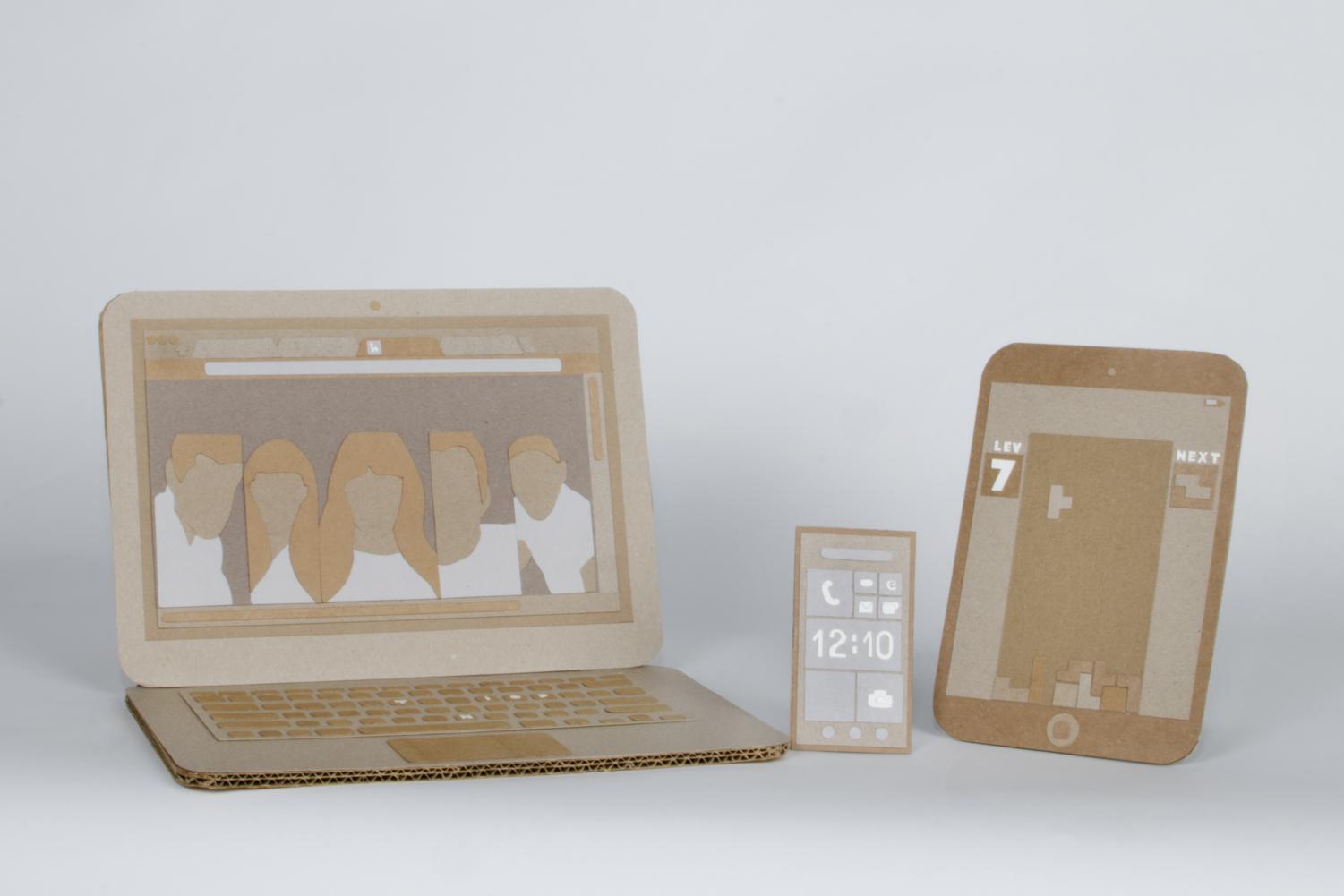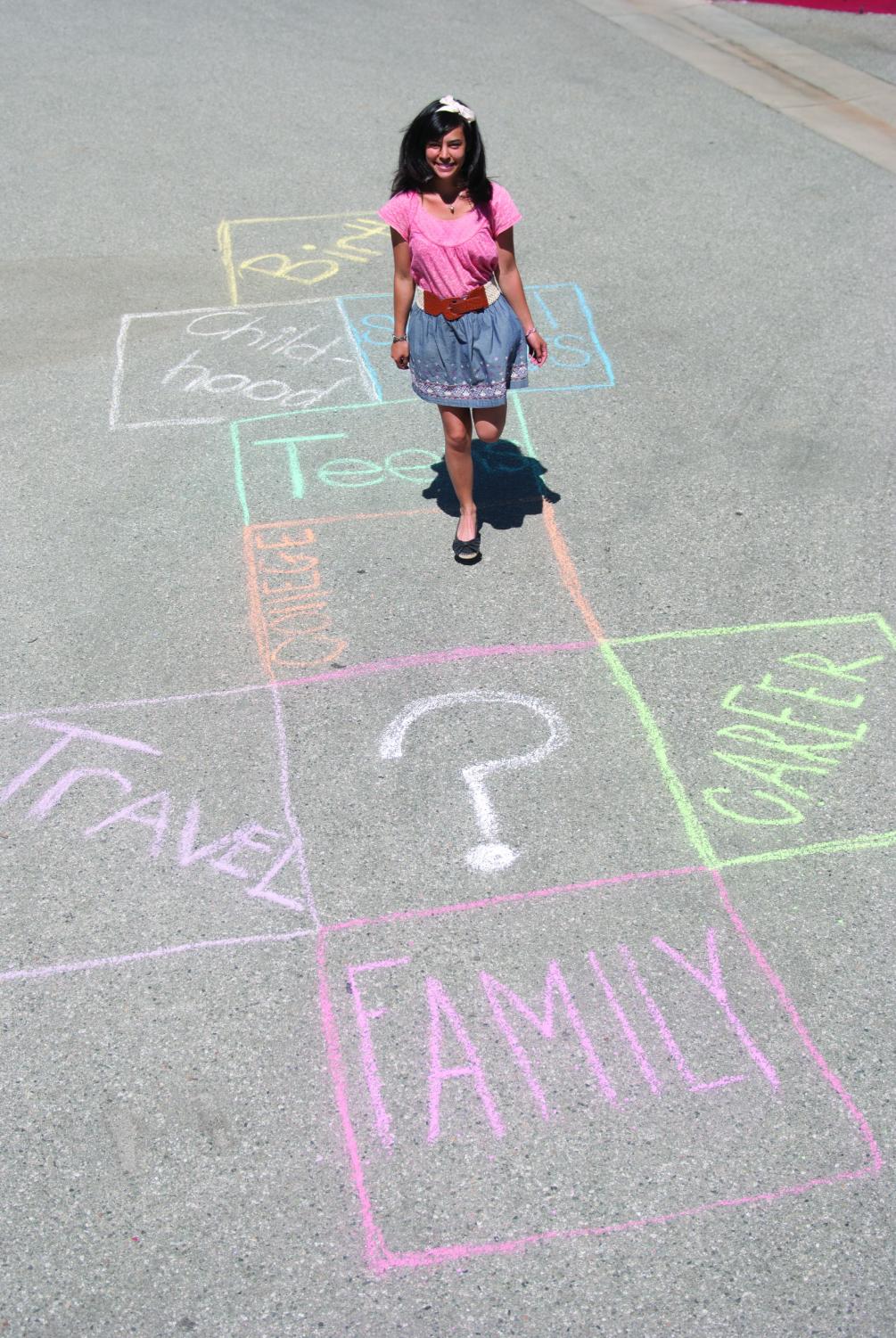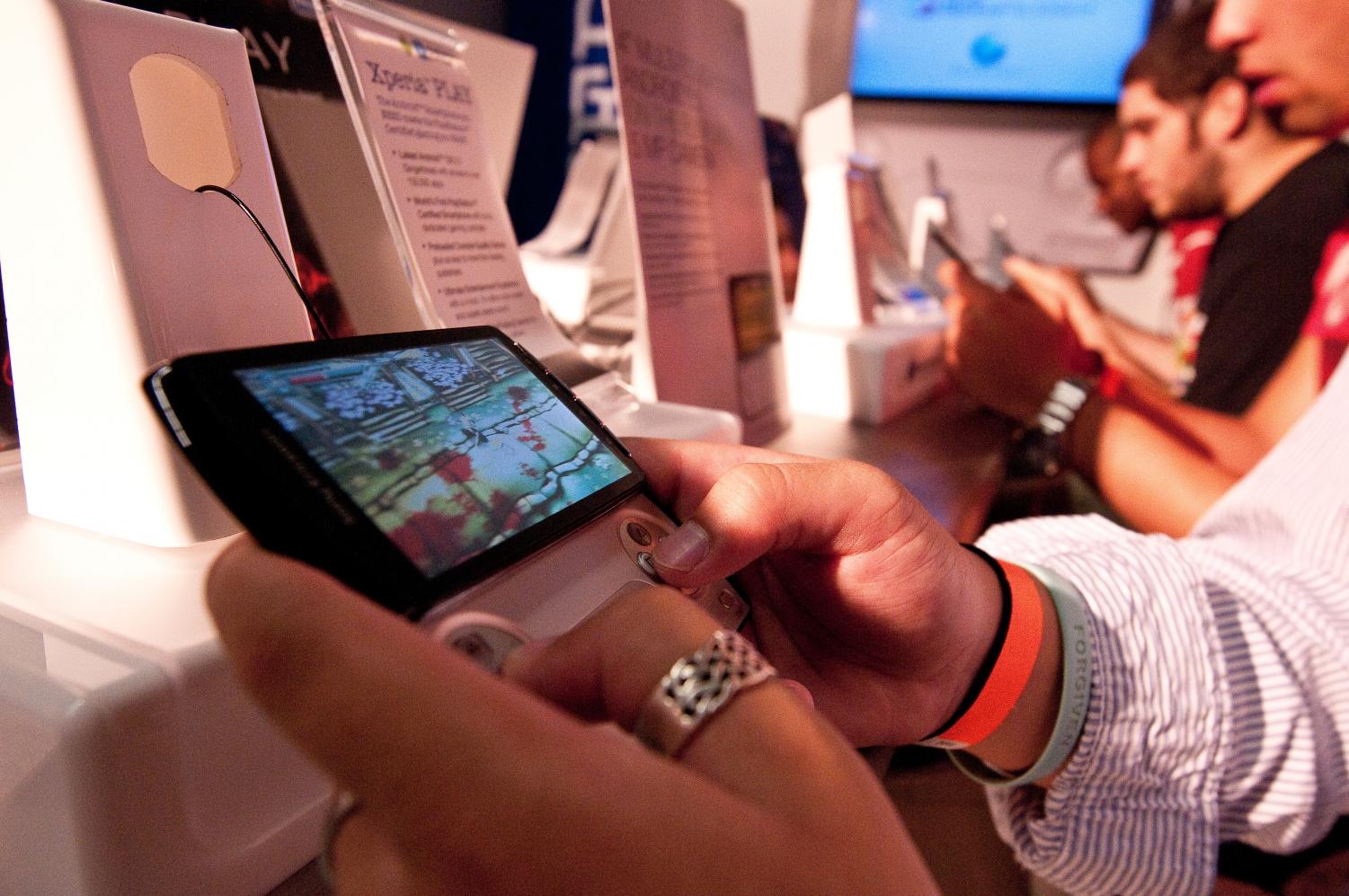Photography by Alissa Sandoval
Written by Rebecca Nakashima
“Name me one thing, one, that we’ve gained from technology.” Greg Kinnear’s character incredulously asks Meg Ryan in the 1998 romantic comedy “You’ve Got Mail.” In the film, Ryan’s character enters the exciting new world of email and eventually develops more of a relationship with her online pen pal and the “you’ve got mail” screen on her laptop than with her real-life boyfriend. Thankfully for her, Tom Hanks is the one on the other side of the screen and they eventually meet up in perfect Hollywood fashion. However, before his untimely exit, Kinnear points to his then-girlfriend’s computer in frustration and says, “You think this machine is your friend, but it’s not.”
In a society where there are more cellphones than cars, according to a 2011 study published on the technology website AnsonAlex.com, a close relationship with an electronic device is not out of the ordinary. People are virtually never alone; they are always accompanied by a laptop or smartphone, always digitally connected. By 2014, the magazine Siliconindia predicts the number of cellphone accounts will exceed the world population with 7.3 billion accounts in total. Increased access to technology used to communicate easier achievement of a task, but now technology embodies a world of emails, texts, tweets and alerts; an inescapable connectedness. Instead of functioning as a tool to make life easier, technology has become the expectation.
Testing Our Tech Dependence
In his class Engaging Worldviews, communications professor Dr. Tim Muehlhoff incorporates an often passed-over spiritual discipline into his class through a challenging three-day assignment. On the first day students are allowed to use one hour of technology. The second day they are allowed half an hour. The third day they are restricted from using any technology and are encouraged to spend at least an hour in prayer and meditation. Of the 30 students in the class, only five completed the assignment.
Charissa Standage, senior communications major, was one of the five students. Surprisingly, she remembers the first two days of the assignment as being harder than the third, because of the “flood-gate effect” of technology. If you use a little bit of it, it is hard not to use a lot. Recalling how surprised she was to discover her dependence on technology, Standage describes how getting stuck in traffic became all the more annoying because she could not listen to music as she waited. Through the experience, Standage recognized little things like the beauty of the hills bordering the 55 freeway, and also cherished the time and space this technological Sabbath provided her with to think through things and realize God’s blessings in her life.
“At the end of the day there was a small hint of lament about going back to technology,” Standage remembers. “Because the unfortunate thing is, no matter how awesome that day was, we live in a world where technology is so crucial you can’t just get away from it. So it was kind of sad watching the sun set that night and realizing it was symbolic. This is the sun setting on a day where I was freed from all responsibilities and restraints I have.”
The Difficulty of Unplugging
The act of being unplugged is a foreign concept to many people. It can be restful for a while but can also lead to a life in limbo, where being disconnected means feeling cut-off from the real world.
“When you have these moments of solitude you almost get this antsy feeling of, ‘I could be doing stuff or looking at stuff,’” Muehlhoff says. “And I think that is really what scares me the most. We’re losing the ability to meditate; we’re losing the ability to do one thing at a time; we’re losing the ability to be in solitude.”
Muehlhoff often quotes Plato to his classes, saying you cannot open your soul to anything and not be affected. Or, in Muehlhoff’s words, “as we use technology, it is using us.” Our culture and people individually are being molded by it. Muehlhoff calls technology a “double-edged sword.” On one hand, it does make life easier, but now the standard has also increased about what people are expected to accomplish. It is an expectation that blurs the lines of limitation and dissolves moments of privacy and escape.
“There’s a total lack of boundary,” Standage agrees. “And because of that, there’s this sense that you can always be doing something and you should always be doing something. And if you’re not forcing it on yourself, someone else is forcing it on you. It’s kind of like a hamster wheel — you’re just constantly running on and responding and correlating.“
Technology Changing Us
Scientific research has been conducted that backs this worry. According to a 2012 study by University of Gothenburg doctoral student Sara Thomee, heavy use of cellphones and computers increase the risk of sleep disorders, stress and depression in young adults. Though the reason behind this connection is yet to be determined, theories suggest artificial light disrupts the melatonin production necessary for sleep. Stress can even be triggered by the appropriately named “inbox fatigue,” which a person experiences just by looking at a crowded inbox full of newsletters, spam, social media updates and other messages.
Beyond these medical effects, Muehlhoff argues that technology has also changed the way we interact. The ability to be mindful, or fully present in the moment, has diminished while attention spans have shortened and the need for instant gratification has risen. In other words, the more connected we become digitally, the less connected we are to each other.
Always Pursuing, Never Arriving
Sometimes, the easy living technology promises through high-speed Internet, 4G service and slick touch-screens remains the proverbial dangling carrot enticing us ever forward, while never actually getting any closer to reaching it. Often, it is hard to separate the negative effects of technology from its obvious perks. For students, the ease it affords can regularly outweigh the addictive pull or social façade that is so easily bought into. Technology has revolutionized the academic world into a place where PowerPoint accompanies most lectures, laptops are required to keep up with note taking and unexpected questions on study guides are quickly answered, courtesy of Google.
“If we didn’t have technology, I think I would be more stressed,” says junior computer science major Kyle Yount. “Internet is the biggest thing to ever come to academics. I was in a science lab when I forgot how to do an algebra problem, and I was able to go on a website that does algebra for you. In a way, technology is advancing knowledge more than it ever has.”
Imagine how much longer the lines at Target would be if cash registers and card readers were replaced by abacuses and ledger books. How would a hospital function without MRI machines? iPhones have become extensions of hands as keypads are pummeled by fingers at an average rate of 109.5 texts per day, according to a 2011 Pew Institute survey. As Yount expresses, technology has become so fused with our society, it is now necessary. “There are so many aspects of life now that are dependent on technology,” Yount says, “that if someone were to pull the plug on all this, we don’t even know what would happen. What would happen if everything we know right now just vanished? We’d have withdrawals, we’d have to improvise, businesses would go completely haywire.”
Technology Reshaping Daily Life
As technologically-infused as this generation is, Yount believes people his age still possess a sense of comparison to an earlier, less advanced time. Because of this, he feels his generation is less inclined to confuse real life with virtual profiles and is ultimately more appreciative of the advancements they enjoy.
“We’re able to adapt it in a more natural way,” says Yount. “We’re able to see the contrast between real life and technology and we’re able to separate those. I feel like we’re the last generation that will be able to do that.”
College-aged adults today grew up right along with the Internet, from dialup to DSL to Wi-Fi, but children being born today will not be able to conceive of pre-Internet life. They will grow up learning their alphabets on touch-screens with the virtual world at their fingertips. True, it is a small contrast. Yet, AT&T plays with its significance in their commercial for U-verse High Speed Internet in which the 14-year-old brother reflects on the old days explaining, “Sometimes it took a minute to download a song. That’s 60 seconds, for crying out loud!”
Whether or not today’s generation actually differentiates reality from its online counterpart, it is clear that technology and the use of social media sites such as Facebook and Twitter have actually changed the way people think about their lives and existence. Looking for reactions, Facebook users post about how awful their days have been when they want sympathy, or write statuses about getting a job when they want people to be happy with them.
“Without meaning to, we frame our day in statuses,” Standage says. “A lot of times I think, ‘this is going to make such a good status’ when all I did was go to the store and pay with all dimes. But the world needs to know. It’s all these pointless things that we attribute meaning or significance to, and in return we expect others to give us that affirmation. We have become a really attention-hungry society because of that.” The bigger contrast lies in generations before today’s young adults — a generation perfectly comfortable with interacting face-to-face simply because that is what they have always done. Technology can seemingly widen the gap between the two age groups, creating a space where the older rejects it and the younger embraces it. The biggest difference is that technology results in a completely new language and basis for interaction. As a waitress at Black Angus, Standage regularly interacts with this older generation, easily noticing the difference in communication.
“[They] just sit and chat, and it’s really uncomfortable for me,” Standage explains. “For them, they don’t know anything different because they’re used to cultivating that interpersonal interaction that our generation is completely skipping over.”
Virtual Realities The Norm
Just as Facebook has introduced its users to an easier-to-read timeline profile, technology has established a new language through which the present generation communicates, relates and engages. A language where abbreviations such as “LOL” and “OMG” are outnumbered only by emoticons; many relationships are mostly composed of online interactions and texts; and conversations that usually excel in small talk are attempting to go deeper and more personal in the digital environment. All of this is not necessarily a bad thing.
As Muehlhoff explains, one vitally important type of communication is phatic communication. This deals with the everyday small talk, the friendly surface speak that, though not necessarily deep, remains essential to how people relate to each other.
“As far as establishing the phatic, tweets, texts and Facebook comments are great ways to do that,” Muehlhoff says. “If that’s all I did, then I would say that’s not good, but conversely if all I did was the dramatic, intense conversations, I would say you need to back up and work on your everyday communication. Technology is a nice way of protecting the phatic communication.”
Even now, texting, Facebook and emails are supporting conversations on an increasingly deeper level. A number of people are beginning to use the tools and ease technology affords to live more advantageously. High school reunions happen every day instead of every ten years because of Facebook; new drivers rely on GPS devices to travel anywhere they want to go; and shoppers are able to purchase new wardrobes without ever leaving their homes. People are clearly beginning, as Yount suggests, to “embrace what technology is.”
Looking Ahead
As technology continues to advance with every passing second, our attempts to keep up with the ever-changing world it creates can seem even more futile. Will our future involve a society of “users” rather than “people,” tech-talking toddlers and a method of conversing that resembles binary code more than any present-day language? Or will our society rebel from its present course and begin to swing the other way, allowing the infusion of technology to dissipate and become less integral? Whatever the future may hold, in the present, Muehlhoff advocates for the importance of remaining in touch with the world outside of our monitors and touch-screens. Sometimes, a small break is necessary to focus us back on reality.
“God wisely understood the human makeup when he said every week you are to have a Sabbath,” Muehlhoff says. “I’m not saying that is a [specific] day of the week, I’m saying it should be a day that is qualitatively different from what you did the other six days. I would say technologically, it would be good to get unplugged that day. We need to find these small little pockets where we can meditate, think and pray.”





